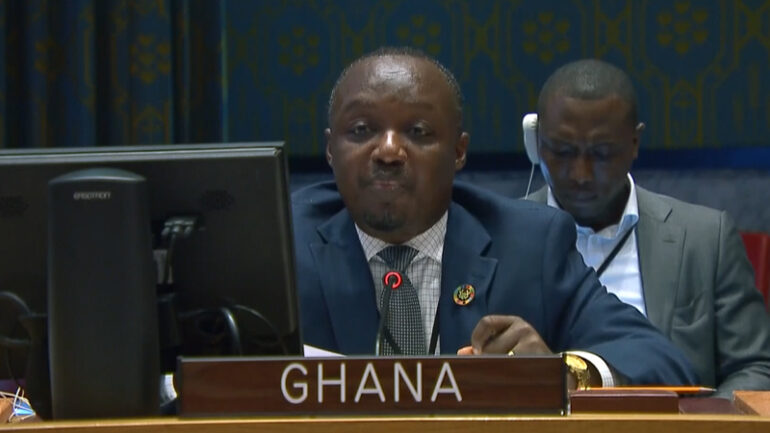Report of the Prosecutor of the International Criminal Court on Sudan

Mr. President,
I would like to join previous speakers in thanking Mr. Karim Khan, Prosecutor of the International Criminal Court (ICC) for his 35th briefing to the Council on the activities of the Court on the Sudan file. We welcome the fact that the Prosecutor is at this moment in Sudan and believe that the facilitation of his presence is a sign of the commitment of the Sudanese authorities to help the Court address all outstanding matters. I also wish to welcome Ambassador Al-Harith Idriss al-Harith Mohamed of Sudan to this meeting.
Mr. President,
The present report of the Prosecutor to the Council demonstrates the Court’s seriousness in dealing with impunity in Sudan. Of particular note is the landmark trial proceedings that commenced on 5th April 2022 in the case of Ali Muhammad Ali Abd-Al-Rahman (“Ali Kushayb”) which is of significance because it is the first trial at the Court based on a referral from this Council. Ghana believes that this trial sends a strong signal to all would-be perpetrators of atrocity crimes that though the wheels of justice sometimes grind slowly, accountability and justice, at the end of the day, is inevitable.
On the other aspects of the report, Ghana wishes to highlight the following three points:
(a) Firstly, whilst calling on the Court to carry out its mandate enshrined in the Security Council referral, Ghana notes the challenges facing the Court in the light of the current complex political and security situation in Sudan. It is, however, gratifying to observe the cooperative approach being taken by the Court in engaging with the competent Sudanese authorities. Furthermore, the Court’s engagement with the relevant national authorities is a positive step in confidence-building towards desired results. Ghana has always maintained that it is primarily the responsibility of States to protect their citizens, and as such, the State must be consulted in such matters. However, cooperation should not be overtaken by /(subordinated to) the principle of complementarity, which is a core principle of the Rome Statute. It is, therefore, worthy to note the Court’s willingness to continue with its dialogue and the exploration of innovative approaches to address accountability at the domestic level. We take this opportunity to call on the Government of Sudan to show support in that regard. We, also, encourage the Court to continue to work with the Sudanese judicial system and provide the needed technical and capacity-building support. Certainly, the independence of these national courts should be paramount in capacity-building efforts.
(b) Secondly, the measures being put in place by the Court to empower victims, witnesses, and affected communities by bringing its work closer to the affected communities through the proposed increase in the frequency of missions to Darfur as well as the enhancement of the Court’s permanent field presence are worthy of note. In that regard, we applaud the Prosecutor for his planned meeting with victims and survivor groups in internally displaced people’s (IDP) camps in both South and the Central Darfur States during his ongoing visit to Sudan from 20th to 24th August 2022. The proposed establishment of a field office in Khartoum, as well as the possible locations for the presence of the Court in Sudan, are also welcome developments.
(c) Thirdly, we further note, with appreciation, the steps being taken by the Court in its renewed strategy to increase avenues for accountability through cooperation with third States, and international and regional organizations. Of significance, are the steps being taken to increase cooperation and dialogue with the many African States as well as the African Union. As noted in the report, this approach could help address not only the lack of cooperation between the Court and the Sudanese authorities but could also garner the broadest support to address issues of accountability in other cases that the Court is investigating.
Mr. President,
I wish to conclude by once again thanking Mr. Khan for his efforts in fighting impunity by relocating from The Hague to Khartoum, particularly, for meeting with victims and survivors of atrocity crimes in Darfur. This approach will help in demystifying the invisibility of the warlords who are seen as untouchables in their communities and also give hope to victims and survivors that they have a place (ICC) to turn for justice in times of need.
I thank you.
